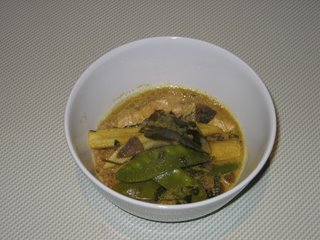But a friend recommended to use the yellow paste instead and today I tried it out. It has lots of turmeric in it, which gives the colour and also, it seems, peanuts, because at one point during the cooking it smelt of satay sauce throughout the house. Also, as usual, I add a lot more vegetables than prescribed in the recipe, it just doesn't work for me otherwise. You have to have loads of veggies.
I also bought a green curry paste and I'll try that out at the next opportunity.
2 cans (400 ml) light coconut milk (i. e. reduced fat)
3 tbsp curry paste - red or yellow, I have yet to try green, but I don't see why not.
500 g chicken or turkey breast cut into very thin strips - 1 cm thick
2 tbsp fish sauce (this is evil stuff, so I'm very stingy with it)
3 tbsp caster sugar or 4 tbsp granulated sugar for added sweetness
vegetables
10 dried kaffir lime leaves
1 dl fresh Thai basil leaves, coarsely cut
3 tbsp fresh coriander, cut in smallish bits (optional)
- Heat half the coconut milk in a large non-stick pan, wok shaped is recommended.
- Add the curry paste of your choise and stir it in well and let boil for 2 - 3 minutes.
- Add the chicken/turkey and let boil for another 5 minutes.
- Add the fish sauce, sugar and vegetables and bring to the boil and let cook for 5 - 10 minutes (depending on the vegetables, cook until they are almost done).
- Add the remaining ingredients - the rest of the coconut milk, kaffir lime leaves and Thai basil leaves. Bring to the boil once more and let cook for 1 - 2 minutes.
- Measure up the amount of rice, usually I do 1 dl per person and that's rather generous.
- Rinse through a couple of times.
- Put in a pot, add twice the amount of water, cover and bring to the boil. Cool until all liquid has been taken up, about 10 - 13 minutes.
- Take the rice off the hob, remove the lid and cover with a tea towel, this absorbs the steam coming out of the rice, but doesn't make the top layer go dry.
- This is a very sticky rice, so if you have a dishwasher, make sure every grain is removed from the pots and plates before putting them in, or you'll kill your dishwasher.
Aubergines, courgettes cut in thin strips. I think I like regular purple aubergine better than the plum sized Thai ones, they tend to be rather tough.
Baby corn, cut in four along it's length.
Mangetout
Peas, canned regular sweetcorn.
Beansprouts - either fresh or canned from the shop, or make your own - though this requires advance planning - they take 4-5 days to make.
Broccoli - cut in bite-sized pieces.
Peppers, carrots again in thin strips.
Potatoes would work too, and then there's no need for rice.
Bamboo shoots.
Water chestnuts - sliced.
Whole canned button mushrooms, or sliced fresh mushrooms.
Onion, leek or spring onion in slices.
If you are using canned vegetables, drain them, the curry has quite a lot of liquid in it anyway and any fresh vegetables will release more as well.
So just pick a few of the list and use them in the curry - it won't perhaps be strictly traditional, but it's very yummy and that's what counts in the end. To bear in mind that hard vegetables like carrots take a bit longer to cook, so if you want them cooked, they should probably either go in with the chicken or be grated coarsely rather than cut into strips. Or if you don't mind them a bit crunchy, they can go in with the rest of the vegetables in strip shape.
Update on 6 November 2006:

Even with just 3 tbsp curry paste, the curry had quite a kick to it and I had a coughing fit (as I tend to every time I eat hot food, it's really embarrassing, as I can handle the heat, I just have trouble starting). I also made some adjustments to other quantities - 4 tbsps of granulated sugar makes it sweeter. And since I had some fresh coriander, I put it in as well. The choice of vebegables was 200 g mangetout, 150 g babycorn and 300 g diced mushrooms. Instead of the Thai Jasmine rice, I served with "pilau" rice as recommended by my Mum.
No comments:
Post a Comment